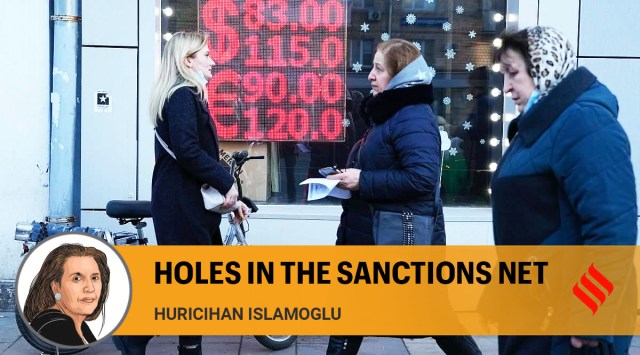
A shift is taking place in the business of global dominance and hegemony, from the model of expressing force through troop presence to financial sanctions. It is led by the US and has become recently visible in the US and EU sanctions on Russia.
From rule-bound globalism, there is a move to an understanding of the management of individual economies, bound together by multiple networks of investment and trade. This is a global economy of individual rivalries between countries and corporations, continually shifting alliances, and contingencies overtaking assumed structural certainties. It demonstrates the emergence of an intensive rivalry among individual countries, exposing their red lines with the potential to turn into a military confrontation — the Uyghurs and Taiwan for China; the US presence in the Pacific; Ukraine for Russia, the latter already militarised.
In Afghanistan, financial manipulations from afar in the form of sanctions may result in subjecting trading activities and investment ventures to the approval of the US Treasury through a system of licencing. If put into effect, it would give the US government the ability to exercise control over a government or its activities or both, and also over those countries or corporations trading with or investing in Afghanistan, by confronting them with the legal and financial risk of sanctions. This may give the US a say in who trades with whom, but already China has found ways of working with or around US sanctions in several countries, including Iran.
Another way of exerting control from afar is through the confiscation of foreign exchange reserves in American banks. Following the withdrawal of the American troops on August 15, the US froze Afghanistan’s foreign exchange reserves of $7 billion deposited in the New York Federal Bank. The Taliban demanded the unfreezing of the funds, much-needed in Afghanistan where, according to the UN, more than half of the population is under threat of starvation. On February 11 came the shocking news that the Biden administration will split the funds between compensation for 9/11 victims and humanitarian aid for the Afghans.
Who are the beneficiaries? The US policy of using economic tools for realising foreign policy and overall national security objectives prioritises the private sector. Sanctions are designed by the government and implemented by both profit-making and non-profit private enterprises, domestic and international NGOs (including the United Nations). As a result, private sector actors become important in “leveraging and calibrating sanctions” in the service of broader foreign policy and security ends. Meanwhile, the Afghan economy has collapsed.
What about the secondary effects of sanctions? For instance, how will China deal with the sanctions in Afghanistan especially as the Taliban views China as its economic lifeline to rebuild the country? What about the economic lever that this gives to China in its dealings with the Taliban, to the Chinese state-owned enterprises and private corporations with an opportunity to invest in Afghanistan’s infrastructure, linking it to the Belt and Road project, and in its rich mineral resources of copper, cobalt, and lithium? China could also use this as an opportunity to unite investments in Afghanistan and Pakistan, isolating India. Will all these advantages and opportunities be left to the mercy of the US Treasury? If China wants to contest this, what would be channels for contestation and negotiation?
This is not clear. But China and Russia, in concert, may provide a way out of the sanctions regime. Russian military and political escalation to re-institute control over former Soviet regions, including Ukraine, Belarus, and Kazakhstan, and the rapprochement between China and Russia against the West, may open up new possibilities for China in Middle Eurasia. It may also point to a recasting of power configurations between the Western alliance, Russia and China.
Banning Russia from the SWIFT system of international payments is a problem for the global financial system. The US announcement initially banned “certain” banks. The Russian economy is more isolated, protected and less reliant on international funding than was the Afghan economy with 75 per cent of public expenditure paid by foreign donors. Russia’s economy is dominated by domestic lenders. So far, the possible impact of sanctions on Russia is estimated at a 1 per cent loss in GDP.
The impact of any disruption in Russian exports of oil, gas, palladium, wheat and fertiliser at a time when those prices are barely recovering from inflationary pressures caused by Covid-19 disruptions, is likely to offset any leverage the Western sanctions may hope to gain.
Above all, the Ukraine incident shows an emerging division of labour between China and Russia, with China focusing on the economy. This leaves the Russians to attend to the political and the military aspects of keeping the US out of Eurasia while at the same time drawing a wedge between the EU and the US.
In refusing to support the Western alliance beyond general platitudes, China has risked alienating major trade partners in Ukraine, the EU and the US. By supporting Russia, Beijing is suspending its long-held position of no interference in the internal affairs of individual countries, inviting plentiful speculation about whether Putin’s move in different Eurasian regions could provide Xi with a precedent in Taiwan.
A new global Great Game is unfolding before our eyes with China, confident in its global economic powers, busily manipulating its own public opinion via Weibo to ensure that the right lessons – which confirm the rights of old empires over various populations – are drawn from the Ukraine incident. In the new game, the Western alliance led by the US seems lost in a maze of sanctions, largely ineffective in a global economy, the control of which is eluding its grip.
This column first appeared in the print edition on March 2, 2022 under the title ‘Holes in the sanctions net’. The writer is a Visiting Fellow at Gateway House, Mumbai and a professor o Economic History, Bogazici University, Istanbul.